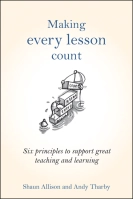 The 15 minute forum tonight was led by maths teacher Shane Borrett. Shane has been thinking about ways in which we can ensure our low ability students are successful. He suggested the following.
The 15 minute forum tonight was led by maths teacher Shane Borrett. Shane has been thinking about ways in which we can ensure our low ability students are successful. He suggested the following.
- Have high expectations of what they can achieve in a lesson and plan accordingly. So, rather than starting with easy work and not really progressing (because they ‘probably won’t get it’), start with more challenging work and support them to achieve this. This links back to the approach of responsive differentiation from Andy Tharby:
- So change your view of them – ‘low ability’ is a very fixed view. It suggests that that is just the way they are. We need to think about this in terms of a growth mindset – that intelligence is not fixed, and can be developed. So rather than low ability, think of them as just having different starting points – but still aiming for the same line!
- Change our expectations of them. How many times have we said/ heard the phrase ‘I’m not going to do that with this group as they’re low ability’. How will we know if they can do it or not, if we never give them the chance? Give it a go – you’ll probably be surprised. A timely reminder of the ‘Pygmalion Effect’:
- Praise the effort they put in and not their intelligence – so instead of ‘You’ve done so well at this, you must be so clever‘, say ‘You’ve done so well at this, because you worked so hard, put in a lot of effort and stuck at it’. This will encourage them to put more effort in, because they are going to get praised for it – regardless of if they get it right or wrong. Whereas if they just get praised for being clever, they won’t try the harder things, for fear of getting it wrong and appearing ‘not clever’.
- Be enthusiastic about your subject. They may well feel quite negative about the subject because of their perceived lack of capability – so you have to model being enthused by your subject.
- Use hinge questions at points in a lesson to see how they are doing – and to check if it’s OK to move on…..and if it isn’t, don’t move on. More on hinge questions here from Harry Fletcher-Wood.
- Don’t compound low expectations by accepting sub-standard work. If you think they can do better, and/ or present their work better, get them to do it again.
- Instil a sense of pride into their work. So in maths, Shane introduced a portfolio of excellence, with his low ability classes:
 This was an opportunity for them to have somewhere where they could proudly display an example of their best work – a hard problem that they had really struggled with. They took great pride in the work that was included in here. This approach has now been developed by the department and is being used across the board – with worked examples of tricky problems (co-constructed by the class), that are then used as a ‘model’ for them to use when solving similar problems.
This was an opportunity for them to have somewhere where they could proudly display an example of their best work – a hard problem that they had really struggled with. They took great pride in the work that was included in here. This approach has now been developed by the department and is being used across the board – with worked examples of tricky problems (co-constructed by the class), that are then used as a ‘model’ for them to use when solving similar problems.- Produce podcasts of yourself (or students) explaining a problem, that they can then access on their phone. This means they can access it when they get stuck, to help them unstick themselves – so developing autonomy.
- Don’t assume they can do things – model it. So, model a solution to a problem with them first, before asking them to try it.
- Support their writing by using sentence starters or a ‘bank of words to use’. This still allows them the freedom to write freely, but gives them a bit of support to do so.
- Mini white boards are really useful for them to work out problems with. It doesn’t matter if they get it wrong, as they can just rub it out and try again, until they get it right. This makes it OK to make mistakes – something they can be very sensitive about.
- Facilitate repetition, through your curriculum. The maths department have chopped their topics up and spaced them about between each other – so you keep coming back to topics (interleaving). This repetition and retrieval aids memory.
- Make feedback purposeful. Feedback should make all students think and do something. So in maths, once their homework is marked, they are set an improvement target from their teacher. This then relates to questions that they have to do, based on these improvement targets, in the next lesson during DIRT time. More here on this.
To summarise
- Kids are great at living up to our expectations of them.
- So set the bar of expectation high.
- You’ll be surprised at the results.














I like the idea of interleaving the topics! Thanks for posting
Pingback: 15 Minute Forums – Autumn 2014 | Class Teaching
A great read!
Pingback: Success with low ability students | petersugden
Really interesting. Some great ideas. Thanks.